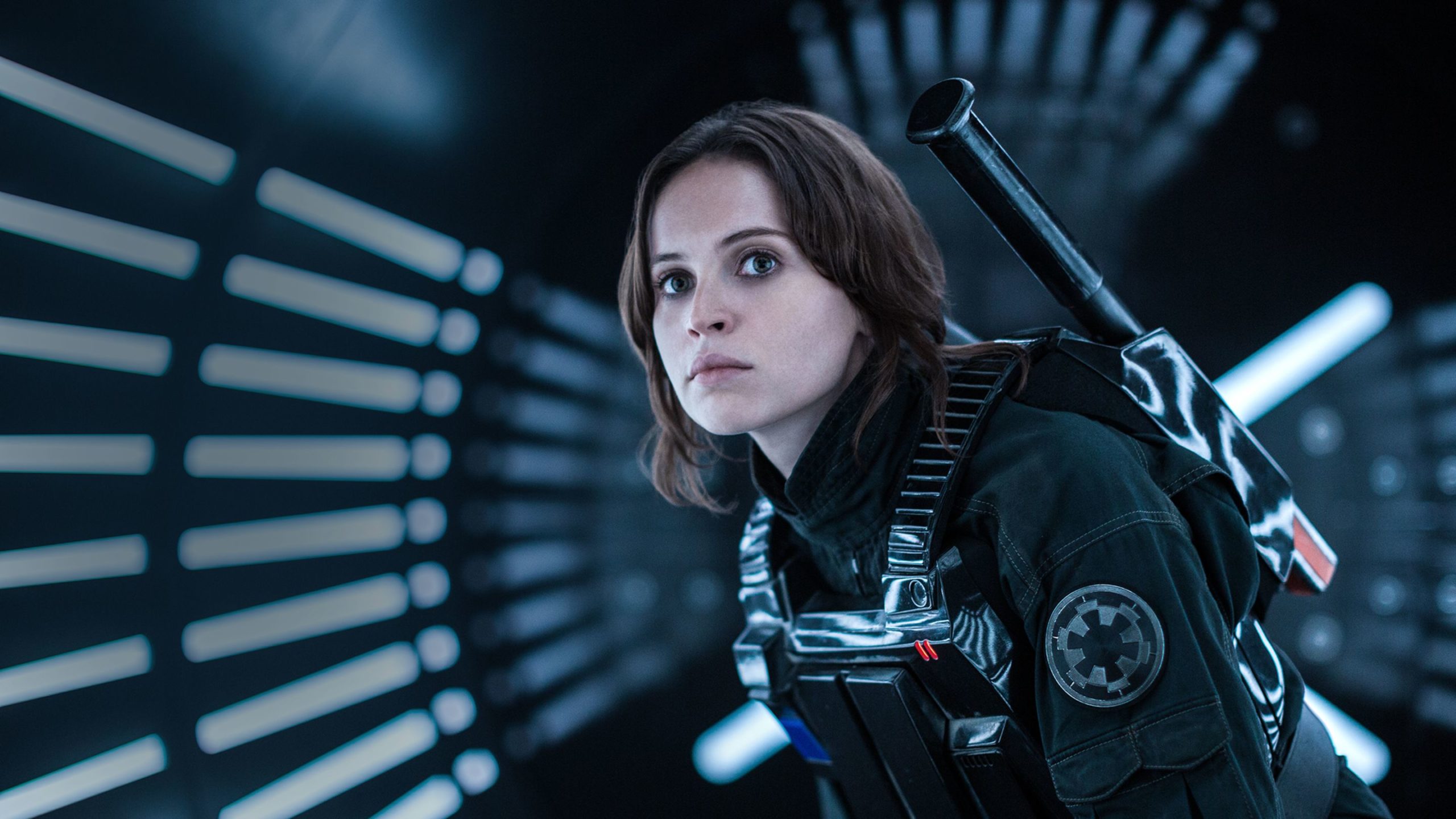Everything old is old again in Rogue One: A Star Wars Story, the first “spinoff” installment from the beloved franchise and one that is largely unmemorable—save a terrific final act—and so slavish to its alignment with the mythology of that famous faraway galaxy it forgets to engage the audience.
A precursor to the opening of George Lucas’ iconic 1977 space opera, Rogue One functions as a run-up to Princess Lea entrusting R2-D2 with a certain very important message in a movie scene that would go on to become revered in American film history. The new picture spends much ado (134 minutes of it) getting us to that iconic movie moment, and most if it feels routinely connect-the-dots.
Helmed by talented Godzilla director Gareth Edwards from a screenplay by Chris Weitz polished by Tony Gilroy, Rogue One, in contrast to last year’s superior The Force Awakens, is a decidedly darker affair, a war picture lacking the buoyancy or fun of the previous film as well as that outing’s endearing young stars. Think The Empire Strikes Back minus its charisma and you get where this picture is headed.
In a standard-issue plot about a fringe rebel faction (good) taking on the Empire (evil) to obtain secret intel on the newly-created Death Star (you know the one), Rogue One gives us a terrific opener as Imperial baddies (led by Ben Mendelsohn) descend upon the peaceful home of former engineer Galen Erso (Mads Mikkelson), forcing him back into servitude as a Death Star architect. Left behind is young daughter Jyn, destined to become an archetypal mythic warrior of lore, but first consigned to an Imperial prison.
A decade or so passes before adult Jyn (Felicity Jones) is sprung from her cell, recruited by a rebel faction to lead a mission against the Empire, one that’s personal for her and transmitted via a hologram by her still living father—a chance to exploit a structural weakness deep within the Death Star and topple the Empire’s plans for intergalactic domination.
The motley crew of rebels also includes Cassian Andor (Diego Luna), a scurrilous knave-type intelligence officer of questionable allegiance, disenfranchised Empire pilot Bodhi (Riz Ahmed, terrific), blind martial arts guru Chirrut Imwe (Donnie Yen), free agent assassin Baze Malbus (Jiang Wen) and a most clever droid named K-2SO (voiced by Alan Tudyk), a former Imperial property now reprogrammed, it would seem, into a smart aleck. This first hour of the film is, frankly, a bit of a chore—been there, done that and several times.
The basic mechanics of the mission involve infiltrating the Empire, deactivating a shield (this time in space), etc., but the execution of the climactic battle and stupendous production design right out of Star Wars and The Empire Strikes Back are a welcome diversion after the monotony of the prior hour. And as a war movie, Rogue One has the guts to imagine final consequences for its heroes, battlefield sacrifices that strive to lift the picture out of escape and into realism.
There’s also the revival of a classic villain or two, including some damned good Darth Vader scenes (voiced by James Earl Jones with a lightly less forceful baritone than employed nearly four decades prior) even when Vader is called upon to deliver a one-liner that feels more like contemporary screenwriting than true to his trademark menace.
It would be tempting to give Rogue One a pass given its strong finish, but the central problem is that Jyn, played with laconic understatement by Oscar-nominee and star Jones, isn’t dynamic enough to root for, and Luna is nobody’s idea of Han Solo, looking too wan for the role and lacking the requisite swashbuckling gene. Their lack of energy saps the film of any reason to care.
Yet the grittiness, including the hardcore killers in the Empire ready to decimate with glee and the strenuous efforts of the outmatched rebels who face, literally, an apocalypse, marks Rogue One as one of the series’ more intense outings. It’s a movie about war and its spoils, and it has visceral propulsion in its second half, making it not one for the kiddies.
While better than Lucas’s prequels, it becomes apparent early that the picture is largely on autopilot, and without a Daisy Ridley or John Boyega to lend a spunk or lightness, Rogue One drifts into merely fulfilling genre requirements.
Notably both the scrolling opening credits and John Williams’ iconic score are absent in this go-round, and the music by Michael Giacchino often trumps up a sense of awe that the story doesn’t match; there is a disconnect.
And while the replacement of both the credits and music indicate an attempt to take this movie in another direction, the story could not be more shopworn. Points, however, go to two exceedingly accomplished digital creations which will not be written of here.
In some corners the picture is being read as a contemporary political allegory about a multicultural rebellion against an all-white, Trumpian dictatorship bent on universal domination, a fair analogy and one that gives the film a sometimes serendipitous timeliness.
2 stars.



